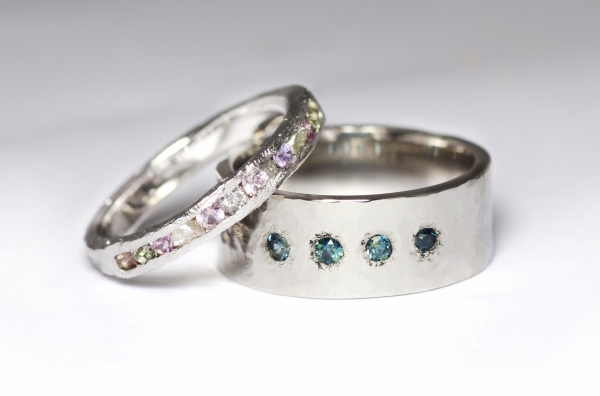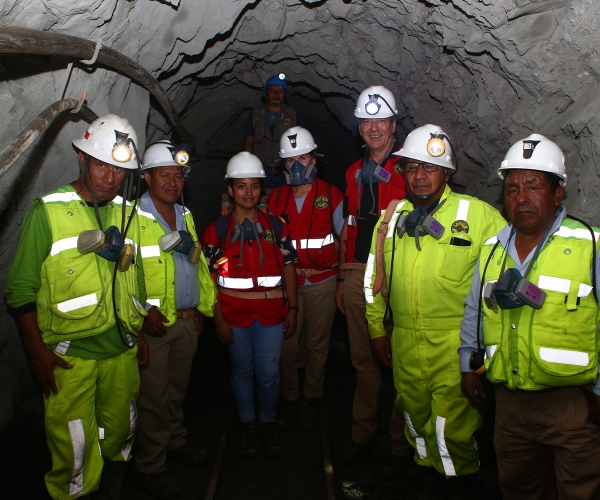Photo Credits: Zoe Pook Jewellery
Is all the greenwashing getting you down? Are you tired of sifting through information to find a product’s actual ethical credentials? Or is there just too much smoke and mirrors to even bother trying to find out?
We talk to ethical jeweller Zoe Pook of Zoe Pook Jewellery to get her straight-talking answers. Happily, says, Zoe, there are only 2 ingredients in a wedding or engagement ring; metal and gems. In order to find out the ethics of each of these ingredients, you must first know where they came from. Let’s start with gold and platinum.
Gold and platinum are mined all over the world, which is why most jewellers find it hard to tell you exactly where their gold comes from. Unfortunately, ninety per cent of the world’s gold and platinum producing workforce is made up of artisanal and small-scale miners (ASM). There are 16 million of these miners and almost all of them work in illegal conditions with little access to sanitation or education. Often, ASM gold ends up being sold at as low as 70 per cent of the international market price.
Because of this, these miners are trapped in a cycle of poverty. They have no money to invest in improving their operations and no way of creating more efficient sustainable mining practices. Without safe methods for gold extraction, in many cases, they are forced to spend their days standing in pools of mercury. International laws protect those involved in large-scale mining and prevent hazardous practices like the unsafe use of mercury. The problem is these laws do nothing to benefit either small scale miners or the environments they work in. Enter Fairtrade Gold…
Photo Credits: CRED
During my early days as a jeweller, troubling images of filthy mines with poor working conditions
prompted me to research alternative gold sources. This led me to become Australia’s first licensed supplier of Fairtrade Certified Gold: a qualification that guarantees the gold I work with has been mined and sold according to Fairtrade standards. There is some confusion about what Fairtrade Gold is. Basically, Fairtrade gold is just gold! It does not differ in composition or quality to gold from any other source. The difference is that Fairtrade Gold has the power to create better opportunities for disadvantaged miners and their communities.
The miners at Fairtrade certified mines are guaranteed a fair price for their efforts. Premiums
paid by buyers are provided to the administrators to spend on improving their business or on
projects which benefit the local community. Fairtrade assistance allows formerly illegal miners to be registered and to receive appropriate training and support. The result is better, more efficient business practices and the opportunity to generate more sales on better terms.
While most gold from bullion dealers in Australia is sourced from big mines which have
approved OHS standards and meet environmental guidelines, the point of using Fairtrade gold is to support change in an area that desperately needs it.
We source our Fairtrade Gold from Peru and hopefully soon from East Africa too.
The other option is to get your rings made from 100% recycled metal. Recycled metals are taken from old jewellery, old photographic materials, vintage jewellery and waste from jewellers’ studios. This scrap is refined and 24ct gold or pure platinum is extracted. There are a few refineries around the world that sell 100% recycled metals to jewellers. You can also recycle your own vintage jewellery. We can use the gold and gems from a family heirloom that isn’t quite your style, or a sentimental gem or jewellery piece and turn it into something to be cherished.
Photo credits: Zoe Pook Jewellery
Diamonds and gems are the next pieces of the puzzle. Diamonds are a little easier than coloured gems. Some of you may have heard of The Kimberley Process, which is essentially a tagging method for all diamonds sold on the international market. Whilst initially a good system, it now has some flaws. A better way to be sure of the ethics of your diamond is to source from one of 3 countries – Australia, Canada or Botswana. Until there is a Fairtrade or similar system for diamonds, these are the safest countries to source from, larger Australian and Canadian diamonds will come with a laser inscription to track to the source.
With coloured gems, there is no internationally recognised system to identify their ethics or trackability. However, as they don’t attract the price tag of diamonds (mostly) they also don’t attract the corruption levels and ethical problems that diamonds do. Sapphires are mostly sourced from Sri Lanka or Madagascar. Both countries have small scale mining, whilst not perfect, they are often family-run and profits go back into the areas where the gems were mined, providing much-needed income for the local community. Emeralds come from Zambia or Colombia; spinels (my favourite) from Sri Lanka, Madagascar, East Africa; zircons (not cubic zirconia) from Australia, East Africa. We are very lucky in Australia to have a rich source of amazing gemstones right in our backyard (sometimes literally!); sapphires, zircon, aquamarine, emeralds, ruby, opal. One company to avoid in this area is Gemfields, they make many environmental and ethical claims but if you dig a bit there are some dirty secrets they try to hide.
Photo Credits: Zoe Pook Jewellery
There are some incredible companies out there in the coloured gemstone world making headway in providing fully traceable gemstones from mine to market. ANZA Gemstones are one of them, we are delighted to be their only Australian supplier. Their gems are bought in person in East Africa, often cut locally or by designer gem cutters in America, they are then sold to a select number of jewellery designers around the world. 10% of the sale price (not just profit) goes back to the gem mining communities. More than that, education and equipment support is provided by ANZA in an ongoing relationship with the gem mining communities. There are several other suppliers with similar ethics that we source from.
It has taken us at Zoe Pook Jewellery many years to find the best suppliers of ethical gold, platinum diamonds and gems from around the world. We are constantly educating ourselves and adding new suppliers. Contact us to talk about creating your own ethical wedding or engagement ring.
Ms Zebra Says: Although it can be difficult, it is SO important to source from ethical practices. Thanks, Zoe for not only sharing your knowledge but also why it’s an important issue to care about!
About Zoe Pook Jewellery: As a classically trained jeweller, attention to detail is first and foremost. She uses traditional tools alongside modern techniques to create beautiful and durable pieces. She finds that working with clients during the design process adds something special and more personal to the jewellery that she produces.










Join the conversation